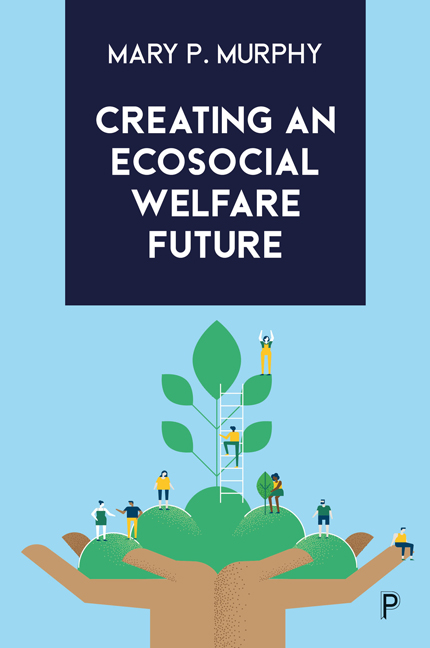Book contents
- Frontmatter
- Dedication
- Contents
- List of figures and tables
- Acknowledgements
- Introduction: The case for a welfare imagination
- PART I From problems to solutions: a post-growth ecosocial political economy
- PART II Building an ecosocial imaginary
- PART III An ecosocial political imaginary
- Conclusion: The case for systemic transformation
- Appendix: Ireland
- Notes
- References
- Index
4 - Reciprocity and interdependence: enabling institutions
Published online by Cambridge University Press: 20 January 2024
- Frontmatter
- Dedication
- Contents
- List of figures and tables
- Acknowledgements
- Introduction: The case for a welfare imagination
- PART I From problems to solutions: a post-growth ecosocial political economy
- PART II Building an ecosocial imaginary
- PART III An ecosocial political imaginary
- Conclusion: The case for systemic transformation
- Appendix: Ireland
- Notes
- References
- Index
Summary
There is an interdependence between people's agency ‘to do and be’ and the societal, culture and structural institutions that mediate their lives (see Chapter 7). An anthropological view of humanity illuminates how survival and flourishing are generated through three functions: distribution/production (the market economy); redistribution (the state); and reciprocity (society, community, kin). A reimagined welfare system needs to address these three roles. While market production and purchase are the primary vehicle of survival in capitalism, reciprocity and redistribution remain embedded features of contemporary societies and imaginative reform can draw on mechanisms to integrate welfare into the tissue of social interdependence.
‘We cannot save the world by playing by the rules, because the rules have to be changed’ (Thunberg, 2019). Institutions are ‘the formal and informal rules, norms, precedents, and organisational factors that structure behaviour’ (Pomey et al, 2010). As humanly-devised constraints and enablers, they structure our political, economic and social interactions (Folbre, 2021, p 23). They influence our opportunities to be and do what we value, while also enabling and constraining our agency, and unequally impacting on different social groups often exacerbating social divisiveness. A new ecosocial paradigm needs to resituate freedom and liberty and generate substantive equality through collective reciprocity and mutual aid. New institutions need capacity to promote new norms, or revive old ones, that can counter behaviours and beliefs that maintain myths of individualism, competition, consumption and selfishness (Folbre, 2021; Jackson, 2021).
This chapter establishes the need for a balanced ecosocial settlement (Button and Coote, 2021). The first part focuses on how institutions might creatively balance reciprocity, freedom and our collective interdependence. The second part discusses how particularly local institutions need to reimagine work and care, enable or facilitate autonomy, and work collaboratively through a culture of co-production, collaboration and participation. This rebalancing requires a rethinking of activation policy as a tool for just transition. Enabling institutions are needed to facilitate socially useful and environmentally sustainable work, enabling social inclusion policy and employment in the care and social economies (Dukelow, 2022). This theme is explored in the Irish case study in the third section of this chapter.
- Type
- Chapter
- Information
- Creating an Ecosocial Welfare Future , pp. 61 - 76Publisher: Bristol University PressPrint publication year: 2023



